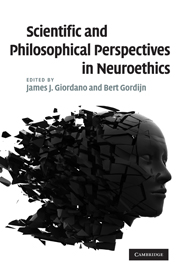Book contents
- Frontmatter
- Contents
- List of contributors
- Preface
- Acknowledgments
- Introduction
- 1 Developments in neuroscience
- 2 The origins of the modern concept of “neuroscience”
- 3 On the cusp
- 4 The mind-body issue
- 5 Personal identity and the nature of the self
- 6 Religious issues and the question of moral autonomy
- 7 Toward a cognitive neurobiology of the moral virtues
- 8 From a neurophilosophy of pain to a neuroethics of pain care
- 9 Transplantation and xenotransplantation
- 10 Neurogenetics and ethics
- 11 Neuroimaging
- 12 Can we read minds?
- 13 Possibilities, limits, and implications of brain-computer interfacing technologies
- 14 Neural engineering
- 15 Neurotechnology as a public good
- 16 Globalization: pluralist concerns and contexts
- 17 The human condition and strivings to flourish
- 18 The limits of neuro-talk
- Afterword
- Index
3 - On the cusp
Published online by Cambridge University Press: 07 May 2010
- Frontmatter
- Contents
- List of contributors
- Preface
- Acknowledgments
- Introduction
- 1 Developments in neuroscience
- 2 The origins of the modern concept of “neuroscience”
- 3 On the cusp
- 4 The mind-body issue
- 5 Personal identity and the nature of the self
- 6 Religious issues and the question of moral autonomy
- 7 Toward a cognitive neurobiology of the moral virtues
- 8 From a neurophilosophy of pain to a neuroethics of pain care
- 9 Transplantation and xenotransplantation
- 10 Neurogenetics and ethics
- 11 Neuroimaging
- 12 Can we read minds?
- 13 Possibilities, limits, and implications of brain-computer interfacing technologies
- 14 Neural engineering
- 15 Neurotechnology as a public good
- 16 Globalization: pluralist concerns and contexts
- 17 The human condition and strivings to flourish
- 18 The limits of neuro-talk
- Afterword
- Index
Summary
INTRODUCTION
When David Chalmers introduced the notion of the “hard problem of consciousness” (1995), he contributed to a revolution in the neuroscience of consciousness and cognition as well as in the philosophy of mind. The main point of the hard problem is that, even if we could discover the “neural correlates of consciousness,” we still would not have answered the “harder” question: Why do those physical events exhibit the property of consciousness, whereas other physical events do not?
I acknowledge that this “hard problem” notion should not be construed as an argument for mind-body dualism, or as a reason to reject physicalism. (More on that later.) None the less, Chalmers' point has important implications for neuroscience in general, as well as cognitive science in particular. There is a tendency in neuroscience to assume that if a brain process B correlates with a mental process M, then B is the physical process that produces M. But this reasoning can lead to gross oversimplifications. There may be a much more complicated process, P, that causes both B and M to occur, and therefore causes B and M to correlate with each other. To be sure, P may very well be a purely physical process. My point is that P often may be a more complicated physical process than just B. In some cases, it may turn out that B is actually a somewhat minor or even peripheral part of the more complicated process P that causes B and M to correlate.
- Type
- Chapter
- Information
- Scientific and Philosophical Perspectives in Neuroethics , pp. 66 - 94Publisher: Cambridge University PressPrint publication year: 2010



